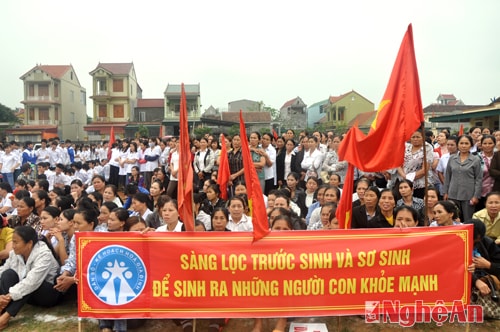Difficult problem in Dien Chau
In recent times, Dien Chau has always attached great importance to the implementation of population work for coastal communes. Projects and programs on population work have always been implemented specifically and promptly. However, the implementation of population policies in coastal communes still faces difficulties and shortcomings...
(Baonghean) -In recent times, Dien Chau has always attached great importance to the implementation of population work for coastal communes. Projects and programs on population work have always been implemented specifically and promptly. However, the implementation of population policies in coastal communes still faces difficulties and shortcomings...
 |
| Propaganda about population/family planning through banners and slogans at the launching ceremony of the reproductive health care campaign in Dien Chau district. Photo: Thanh Hung |
Mr. Truong Duc Nam - Director of the Center for Population - Family Planning of Dien Chau district started the conversation with us by asking: Do you believe that nowadays in Dien Chau there are still people who have a seventh child? I laughed, thinking that he was joking, he said that although he was not happy, he still had to confirm that it was true. After finding out, it turned out that the senior officer with a lot of experience in population work was not joking. That was the case that happened in Dong Ha hamlet, Dien Van commune, a commune located just over 1 km from National Highway 1. The difficult situation of Mr. Ha Van Hoa - Ms. Le Thi Tiem made everyone feel sorry when they had 6 children, in early 2014, his family "broke the plan" and had a seventh child.
In 2014, in Dien Van commune, in addition to the family of Mr. Hoa - Ms. Tiem in Dong Ha hamlet setting a "record" of having a seventh child, there was also the case of the family of Mr. Pham Van Dong - Ms. Tran Thi Thuan in Van Tai hamlet having a sixth child. The population specialist of Dien Van commune said that these were isolated cases, while there were quite a lot of cases of having a third child or more. From the beginning of 2014 until now, 30% of births in Dien Van were of people having a third child or more.
Dien Chau has 9 coastal communes (out of 39 communes and towns), accounting for 29% of the district's population. In recent years, the district's coastal communes have benefited from support programs of Project 52 on improving the quality of coastal population. With the active participation of the population work system in the area, especially since September 2013, all communes have had full-time population specialists working in the area, people in coastal communes have increasingly had opportunities to access reproductive health care and family planning services. However, population work for coastal communes still faces difficulties that need to be resolved.
The perennial difficulty in population work in this area is still the issue of having a third child or more and the gender imbalance. The birth rate and the rate of giving birth to a third child or more in coastal communes are still high compared to other communes in the district, and the gender imbalance at birth is serious. The main reason is still the difficulty in accessing and providing reproductive health care/family planning services.
What is worrying is that the mentality of wanting to have a third child is currently forming even among well-off households, civil servants, public employees, and even prestigious people in society. This has a significant impact on the dissemination and application of population policies and guidelines to coastal communes. Because of the lack of role models in other areas and other subjects, it is an excuse for coastal workers to use the violation of population and family planning policies...
It is noteworthy that the communication, propaganda and dissemination of population knowledge to coastal residents are attended by only familiar faces, mainly those who have implemented well the policies and guidelines on population and reproductive health care, and education on gender equality. For those who have violated or are in the high-risk group for violating population policies, contacting population officials is considered a "sensitive" matter. Along with that, the characteristics of coastal workers are that men often go to sea, stay at sea for long periods of time, women often spend time going to the market, struggling to make a living, so spending time accessing communication content on population/family planning... is almost "rare". Therefore, many population communication campaigns are elaborately organized and widely propagated, "someone speaks", but "there is a lack of people who need to listen", so policies and guidelines are still difficult to put into practice and violations continue, even in some cases, they recur many times.
In 2014, the funding sources for communication support of Project 52 were cut. Therefore, since the beginning of the year, the organization of communication activities on population/family planning has encountered many difficulties, lacking initiative to perform well the tasks according to the plan and resolve the pressure on implementing population policies as required in the locality. The population work team has been strengthened, but the support sources from the locality are still limited, not meeting the requirements for organizing population work activities regularly, continuously and effectively. Along with that, some support contents on contraceptive tools and means have also been cut. In coastal rural areas, up to 70% use contraceptive methods in the form of IUDs, but currently the number of IUDs supported is very small. Currently, communes are ready with funds to buy IUDs, but vertical service providers lack the required product supply to meet people's needs. Therefore, population authorities need to do a better job of forecasting the situation, preparing plans, means, and equipment, and promptly being ready to support, serve, and respond to the need to solve urgent problems at the grassroots level.
Duc Duong






